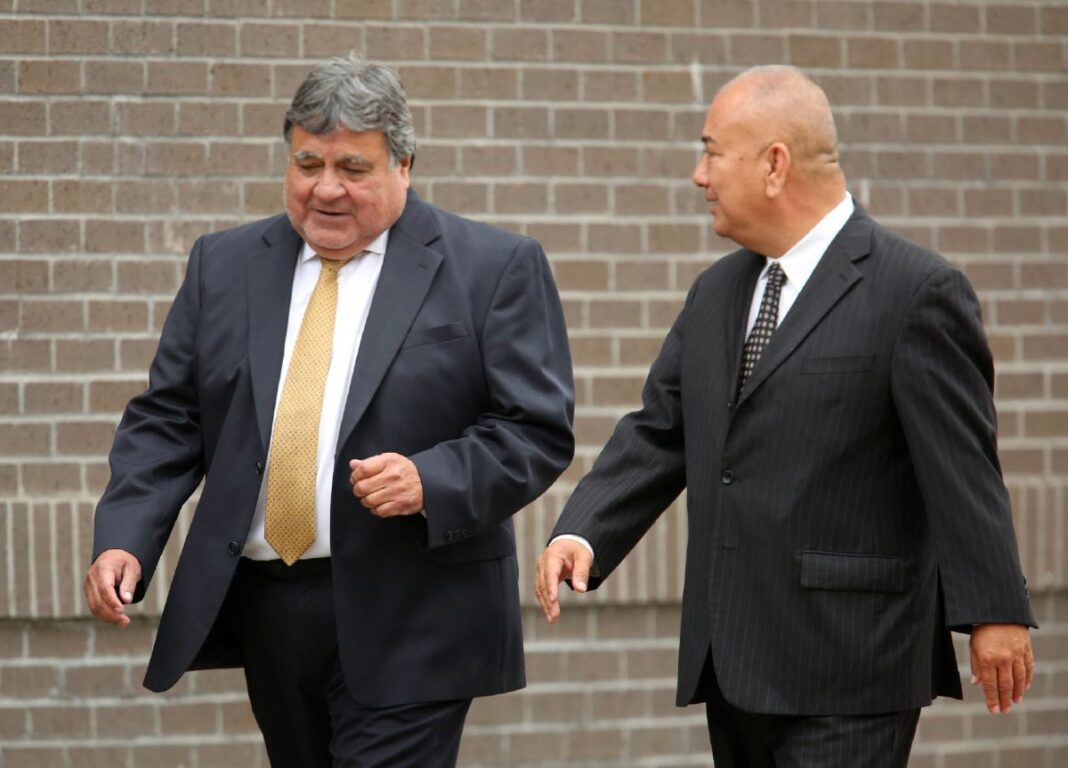Former state District Judge Rodolfo “Rudy” Delgado is getting out of federal prison early.
Scott Taylor, a spokesman for the Federal Bureau of Prisons, said authorities transferred Delgado on July 29 from the FMC Fort Worth community confinement.
He is currently being supervised by the San Antonio Residential Re-entry Management field office.
“For privacy, safety, and security reasons, we do not discuss any individual inmate’s conditions of confinement, including transfers or release plans, nor do we specify an individual’s specific location while in community confinement,” Taylor said.
Delgado first entered federal prison on Nov. 19, 2019.
U.S. District Judge Alfred H. Bennett sentenced Delgado on Sept. 25, 2019, after a jury convicted him on four counts of bribery for a pay-to-play scheme he operated at the Hidalgo County Courthouse.
On July 11, 2019, a jury found that Delgado accepted bribes from former attorney Noe L. Perez in exchange for favorable outcomes in his cases.
Perez cooperated with the government and Bennett sentenced him to two years in prison and two years supervised release the same day Delgado received his sentence.
The Federal Bureau of Prisons released Perez, who is still on supervised release, on July 28, 2021.
As for Delgado, Bennett sentenced him to four years on two of his counts and five years on two others.
However, now his projected release date is Nov. 25, meaning he will have served just three years.
Delgado will remain on supervised release for two years.
Taylor said there are a number of reasons an inmate’s term can be reduced, including good conduct time and through completion of the prison system’s Residential Drug Abuse Program.
While Taylor couldn’t provide details because of privacy reasons for Delgado, he did say that inmates in his situation are defined as being in community confinement, which can either be home confinement or confinement in a Residential Re-entry Center, or halfway house.
Delgado is being released early under the First Step Act and the Residential Drug Abuse Program, or RDAP, Taylor said.
Through the successful completion of RDAP, Taylor said inmates may be released up to one year early.
The spokesman also said good conduct time can be earned by inmates, who can earn up to 54 days of credit for every year a sentence was imposed.
As for the First Step Act, a bi-partisan legislation that former President Donald Trump signed into law on Dec. 21, 2018, includes a component to reduce the size of the federal prison population by requiring programs to assess and reduce recidivism.
Delgado had sought early release through the First Step Act’s compassionate release, which numerous inmates sought during the height of the pandemic.
However, a federal judge denied that motion on May 19, 2020.
The former judge is just one in a long — and growing — list of public officials in the Rio Grande Valley to be convicted or charged with crimes.
Before Delgado, there was the Cameron County courthouse pay-to-play scheme that sent former judge Abel Limas and former district attorney Armando Villalobos to federal prison.
Then there’s former sheriff Guadalupe “Lupe” Treviño, who went to jail for taking money from a drug trafficker, and former Cameron County Sheriff Conrado Cantu, who went to jail for trafficking drugs.
At Delagdo’s sentencing, the judge noted that the jurors in the case told him the public wants this kind of behavior stopped.
“Because they thought that the conduct they saw in evidence (during the trial) had become the way of doing business in the place they call the Valley — and the public wants it stopped,” Bennett said.
Following the sentencing, Christopher Combs, who at the time was the special agent in charge of the FBI San Antonio Field Office, said the sentence would send a strong message to any public official who decides to act in their interests over the public’s interest.
“As this case illustrates, the FBI will tirelessly pursue those who betray the public trust,” Combs said. “We can only hold corrupt officials accountable if people refuse to accept this behavior and are willing to cooperate and come forward with information.”
However, allegations of public corruption continue to plague the Rio Grande Valley.
In June, federal agents arrested Mission businessman Jorge O’Caña Jr. in a wide-ranging public corruption scandal in western Hidalgo County.
O’Caña, the nephew of former Mission Mayor Armando O’Caña and brother to Hidalgo County Court-at-Law Judge Patricia “Patty” O’Caña-Olivarez, pleaded not guilty to witness tampering for allegedly trying to prevent Antonio Gonzalez III from testifying in an official proceeding about a bribery scheme involving contracts awarded to Performance Services, Inc.
Gonzalez is a businessman who pleaded guilty to bribery in April.
O’Caña’s arrest is just the latest in connection to an alleged pay-to-play plot to bilk the city of Mission, the La Joya Independent School District, the Agua Special Utility District and others out of millions of dollars through fraudulent energy savings contracts.





